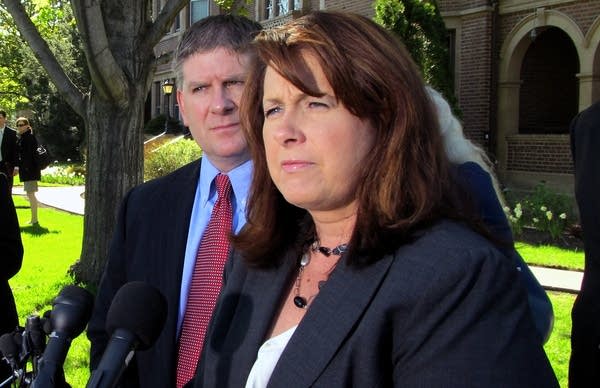Tough to see how Dayton, GOP can agree on budget
Go Deeper.
Create an account or log in to save stories.
Like this?
Thanks for liking this story! We have added it to a list of your favorite stories.

There are now just six days left in the legislative session, and DFL Gov. Mark Dayton and Republicans are still far apart on spending and taxes.
Dayton hosted a largely unproductive breakfast meeting with GOP leaders Tuesday morning. The governor called the Republicans' position on the budget "unreasonable."
Later in the day, House Republicans sent a message to the governor by voting down his proposal to raise income taxes on top earners.
With no budget deal in sight, Republican leaders walked out of the governor's residence highlighting two minor developments. They said Dayton agreed to meet privately with their caucuses, and he also authorized his commissioners to begin negotiating on individual budget bills.
Turn Up Your Support
MPR News helps you turn down the noise and build shared understanding. Turn up your support for this public resource and keep trusted journalism accessible to all.
Senate Majority Leader Amy Koch, R-Buffalo, was pleased with what she characterized as a small bite out of the budget elephant.
"We have to start somewhere, and if you focus on the big, and you try to get this global agreement, that's where the difficulty comes in," she said. "But if we start working the individual bills, we can be successful. That's what we've been saying for four or five weeks. Hopefully today we have some agreement on that."
It's tough to see where the agreement will come. Republicans remain firmly opposed to any compromises on tax increases or on any spending above $34 billion for the next two years. They rejected Dayton's revised proposal for a $1.8 billion income tax increase on the top 2 percent of earners.

House Speaker Kurt Zellers of Maple Grove said it's a matter of protecting businesses and jobs.
"If one taxpayer, one job provider in our state leaves because of a tax increase, that's a bad idea. It's bad for any Minnesotan," said Zellers. "It's never been about our fight between do you raise taxes or not. It's about maintaining Minnesota competitiveness."
Gov. Dayton emerged from the morning meeting sounding decidedly pessimistic about resolving the budget on time. The governor rejects the GOP cuts-alone budget approach, and he also downplayed the start of negotiations on individual bills.
"I made it very clear to them. I'm not going to sign any one of the eight remaining budget conference reports -- seven expenditure and one tax -- until we agree to an overall target," said Dayton. "Because what I would be signing would be part of their mosaic that adds up to $3.6 billion in cuts, and I don't agree with that."
On MPR's Midday program, Dayton called the Republican budget stance "completely unreasonable," and their proposed spending reductions "extreme."
"The tradeoff is, do you raise taxes on 2 percent of people -- a couple making over $300,000 a year, a single person making almost $180,000 a year -- do you you raise their taxes, which they can afford, or do you throw 140,000 people off of health care?" said Dayton.
Dayton accepted an invitation to speak directly to the House and Senate GOP caucuses later in the week.
But House Republicans couldn't wait for that private discussion to again demonstrate their opposition to the governor's income tax proposal. They put it up for a vote. During a lengthy debate on the House floor, Rep. Steve Drazkowski, R-Mazeppa, argued that the governor's plan would kill jobs.
"The people of Minnesota are putting their foot down. They're tired of government continuing to reach into their pocket, damage their families and kill their businesses," said Drazkowski. "The 200,000 Minnesotans that don't have a job would like us to take the pressure off of those businesses so they can have a job again."
The House voted down the measure on a 73-60 vote.
All the Republicans voted against the measure, along with one Democrat -- Rep. Gene Pelowski, DFL-Winona.
Rep. Kerry Gauthier, DFL-Duluth, said property tax increases and spending cuts under the GOP plan would do more harm to business and jobs than Dayton's proposed income tax increase.
"It is a war between the working people and the poor of this state, versus the top 2 percent that you can't ask a penny more," said Gauthier. "I am proud to stand with Gov. Dayton. I am proud to say we need a fair and balanced approach, members. We all need to give in."
If lawmakers don't reach a budget deal by Monday's constitutional deadline for adjournment, they'll need to return for a special session. A partial government shutdown would begin if the impasse lingers past June 30.
Dear reader,
Political debates with family or friends can get heated. But what if there was a way to handle them better?
You can learn how to have civil political conversations with our new e-book!
Download our free e-book, Talking Sense: Have Hard Political Conversations, Better, and learn how to talk without the tension.





